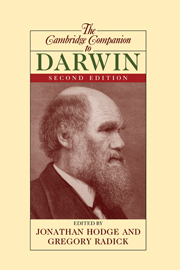Book contents
- Frontmatter
- Introduction
- Part I Darwin’s theorising
- Part II Historical contexts
- Part III Current issues
- 11 From Darwin to today in evolutionary biology
- 12 Metaphysical and epistemological issues in modern Darwinian theory
- 13 Darwinian concepts in the philosophy of mind
- 14 Darwinism in moral philosophy and social theory
- 15 Belief in God in a Darwinian age
- Part IV Philosphical prospects
- Guide to further reading
- List of references
- Index
13 - Darwinian concepts in the philosophy of mind
from Part III - Current issues
Published online by Cambridge University Press: 28 May 2009
- Frontmatter
- Introduction
- Part I Darwin’s theorising
- Part II Historical contexts
- Part III Current issues
- 11 From Darwin to today in evolutionary biology
- 12 Metaphysical and epistemological issues in modern Darwinian theory
- 13 Darwinian concepts in the philosophy of mind
- 14 Darwinism in moral philosophy and social theory
- 15 Belief in God in a Darwinian age
- Part IV Philosphical prospects
- Guide to further reading
- List of references
- Index
Summary
Human beings are part of nature. We are primates, mammals, animals. Animals, in turn, are nothing but very complex biochemical systems. So humans are biochemical machines, though extraordinarily complex ones. That complexity ensures that it will rarely be practically possible to predict future human behaviour, or explain past human behaviour, through a fine-grained molecular understanding of human bodies. But, in principle, a detailed enough understanding of the physical and chemical processes internal to an agent would suffice to predict and explain all of that agent's behaviour. A full list of the complete physical, natural facts about an agent is all the facts there are. The natural story is the whole story. So, at least, the sciences of physiology, morphology, neuropsychology and the like suppose. But humans are also conscious agents. We are aware of ourselves and our world. In Thomas Nagel's famous phrase, there is 'something that it is like' to be a person. What is more, we are rational agents. We are not, of course, perfectly rational. We make errors of reason and judgement. Most of the time, however, our beliefs about our immediate environment are sound, and our actions are rational in the light of those beliefs and our goals. My belief that good coffee is available in the student union may be false, perhaps even unreasonable.
- Type
- Chapter
- Information
- The Cambridge Companion to Darwin , pp. 323 - 344Publisher: Cambridge University PressPrint publication year: 2009
- 1
- Cited by

